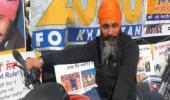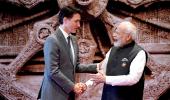Admitting for the first time, a top United States diplomat has confirmed that there was 'shared intelligence among Five Eyes partners' that had prompted Canadian Prime Minister Justin Trudeau's offensive allegation about Indian agents' involvement in the killing of a Khalistani extremist on Canadian soil, according to a media report on Saturday.

There was 'shared intelligence among Five Eyes partners' that informed Trudeau's public allegation of a 'potential' link between the government of India and the murder of a Canadian citizen, CTV News Channel, Canada's 24-hour all-news network, reported quoting the United States Ambassador to Canada David Cohen.
'Five Eyes' network is an intelligence alliance consisting of the United States, United Kingdom, Australia, Canada and New Zealand. It is both surveillance-based and signals intelligence (SIGINT).
Trudeau had on September 18 made an explosive allegation of the 'potential' involvement of Indian agents in the killing of Khalistani extremist Hardeep Singh Nijjar, a Canadian citizen, in Surrey in British Columbia on June 18.
India has rejected Trudeau's allegations as 'absurd' and 'motivated'.
It also expelled a senior Canadian diplomat in a tit-for-tat move to Ottawa's expulsion of an Indian official over the case.
In 2020, India designated Nijjar, 45, as a terrorist.
The CTV's report is based on its exclusive interview on CTV's programme 'Question Period with Vassy Kapelos' that is to air on Sunday.
CTV quoted Cohen as saying that he confirmed: 'There was shared intelligence among Five Eyes partners that helped lead Canada to make the statements that the Prime Minister made.'
'In the days since, as diplomatic tensions continue to ratchet up -- from Canada reassessing its staffing in India, to India suspending visa services for Canadians -- there have been swirling questions about what intelligence is at the centre of this story, who was aware of it, and when,' the CTV report said.
It further added that while Cohen would not comment on whether the intelligence informing the Canadian government's investigation was both human and surveillance-based, or whether it included signals intelligence of Indian diplomats, the US envoy to Canada did say 'there was shared intelligence among Five Eyes partners that helped lead Canada to making the statements that the Prime Minister made'.
This is the first admission by any US government official about the sharing of intelligence by Five Eyes partners with Canada even when there were multiple unofficial and non-official reports about the same.
The CTV report also mentioned that there were reports from the Canadian Broadcasting Corporation (CBC) and The Associated Press that the intelligence Trudeau was speaking of did not come from Canada alone and that additional information was provided by an unspecified member of the intelligence-sharing alliance.
'He (Cohen) made this comment while denying a Washington Post report alleging that weeks before Trudeau's bombshell declaration, Ottawa asked its closest allies, including the US to publicly condemn the murder and that overture was rebuffed,' the CTV said.
'Very bluntly, I will say that -- and you know me well enough -- that I'm not in the habit of commenting on private diplomatic conversations,' Cohen was quoted as saying.
'Look, I will say this was a matter of shared intelligence information,' he said and added: 'There was a lot of communication between Canada and the United States about this, and I think that's as far as I'm comfortable going,' Cohen said.
Cohen's comments came as Secretary of State Antony Blinken said the US is 'deeply concerned' about the allegations raised by Canadian Prime Minister Trudeau against India and Washington was 'closely coordinating' with Ottawa on the issue and wants to see 'accountability' in the case.
Speaking at a press conference in New York on Friday, Blinken said the US has engaged directly with the Indian government on the issue and the most productive thing would be the completion of this investigation.
"We have been consulting throughout very closely with our Canadian colleagues -- and not just consulting, coordinating with them -- on this issue. And from our perspective, it is critical that the Canadian investigation proceed, and it would be important that India work with the Canadians on this investigation. We want to see accountability, and it's important that the investigation run its course and lead to that result," Blinken said.











 © 2025
© 2025